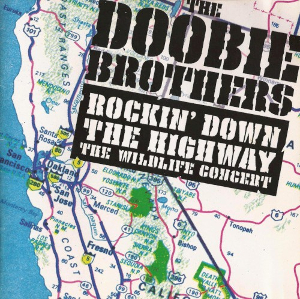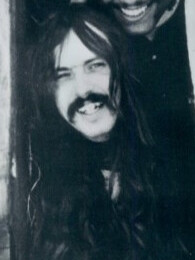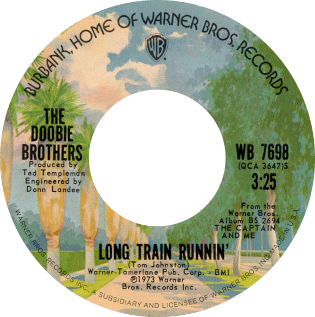
The Doobie Brothers are an American rock band formed in 1970 in San Jose, California, known for their flexibility in performing across numerous genres and their vocal harmonies. Active for five decades, with their greatest success during the 1970s, the group's current lineup consists of founding members Tom Johnston and Patrick Simmons, alongside Michael McDonald and John McFee, and touring musicians including John Cowan, Marc Russo (saxophones), Ed Toth (drums), and Marc Quiñones (percussion). Other long-serving members of the band include guitarist Jeff "Skunk" Baxter (1974–1979), bassist Tiran Porter and drummers John Hartman, Michael Hossack, and Keith Knudsen.

Charles Thomas Johnston is an American musician. He is a guitarist and vocalist, known principally as a founder, guitarist, lead vocalist and songwriter for the rock group the Doobie Brothers, as well as for his own solo career. He has played off and on with the Doobie Brothers for 50 years, in several styles. He was inducted into the Rock and Roll Hall of Fame as a member of the Doobie Brothers in 2020.

Toulouse Street is the second studio album by American rock band the Doobie Brothers. It was released in July 1972, by Warner Bros. Records. It was the band's first album with bassist Tiran Porter and also the first with drummer Michael Hossack to augment existing drummer John Hartman, putting in place their trademark twin-drummer sound. Toulouse Street is the name of a street in the French Quarter of New Orleans. The cover and inside centerfold photos were taken at a former brothel on Toulouse Street.

The Captain and Me is the third studio album by American rock band The Doobie Brothers. The album was released on March 2, 1973, by Warner Bros. Records. It features some of their most popular hits including "Long Train Runnin'", "China Grove" and "Without You". The album is certified 2× Platinum by the RIAA.

What Were Once Vices Are Now Habits is the fourth studio album by American rock band the Doobie Brothers. The album was released on February 1, 1974, by Warner Bros. Records.

Stampede is the fifth studio album by American rock band the Doobie Brothers. The album was released on April 25, 1975, by Warner Bros. Records. It was the final album by the band before Michael McDonald replaced Tom Johnston as lead vocalist and primary songwriter. The album has been certified gold by the RIAA.

Takin' It to the Streets is the sixth studio album by American rock band The Doobie Brothers. The album was released on March 19, 1976, by Warner Bros. Records. It was the first to feature Michael McDonald on lead vocals.

Minute by Minute is the eighth studio album by American rock band The Doobie Brothers, released on December 1, 1978, by Warner Bros. Records. It was their last album to include members John Hartman and Jeff "Skunk" Baxter.

Farewell Tour is the first live album by American rock band The Doobie Brothers, released in 1983. It documents the group's 1982 Farewell Tour and is a double album set.

Rockin’ Down the Highway: The Wildlife Concert is the second double live album by American rock band The Doobie Brothers, released in 1996. The concerts were performed to benefit the Wildlife Conservation Society, hence the album's title.

Live at Wolf Trap is the third live album by US rock band The Doobie Brothers, released in 2004.
Edward JohnTempleman is an American record producer. Among the acts he has a long relationship with are the rock bands Van Halen and the Doobie Brothers and the singer Van Morrison; he produced multiple critically acclaimed and commercially successful albums by each of them.

"Black Water" is a song recorded by the American music group the Doobie Brothers from their 1974 album What Were Once Vices Are Now Habits. The track features its composer Patrick Simmons on lead vocals and, in mid-March 1975, became the first of the Doobie Brothers' two No. 1 hit singles.

Keith A. Knudsen was an American rock drummer, vocalist, and songwriter. Knudsen was best known as a drummer and vocalist for The Doobie Brothers. In addition, he founded the band Southern Pacific with fellow Doobie Brother John McFee. He was posthumously inducted into the Rock and Roll Hall of Fame as a member of The Doobie Brothers in 2020.

"Long Train Runnin'" is a song recorded by American rock band the Doobie Brothers and written by band member Tom Johnston. It was included on the band's 1973 album The Captain and Me and was released as a single, becoming a hit and peaking at No. 8 on the US Billboard Hot 100.

"Dependin' on You" is a song written by Michael McDonald and Patrick Simmons that was first released by the Doobie Brothers on their 1978 album Minute by Minute. It was also released as the third single from the album. It has subsequently been released on live and compilation albums.

"It Keeps You Runnin'" is a song by the American rock band The Doobie Brothers. The song was written by band member Michael McDonald, and served as the third single from their sixth studio album Takin' It to the Streets (1976). It was also covered by Carly Simon the same year and released as the lead single from her sixth studio album Another Passenger.
"Echoes of Love" is a song by the American rock band The Doobie Brothers. The song was written by band member Patrick Simmons in collaboration with Willie Mitchell and Earl Randle. This song served as the second single from their seventh studio album Livin' on the Fault Line.

Listen to the Music: The Very Best of the Doobie Brothers is a compilation album by American rock band the Doobie Brothers, released in 1993. The album has 19 tracks, including a remix version of "Long Train Runnin'". The album reached at number 10 on the ARIA Charts and also peaked at number 19 on the Official New Zealand Music Chart.

"Wheels of Fortune" is a song written by Patrick Simmons, Jeff Baxter and John Hartman. It was first released by the Doobie Brothers on their 1976 album Takin' It to the Streets. It was also released as the second single from the album.

















